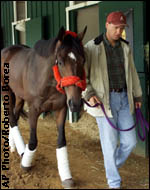| |
Even for professionals, it's a guessing game
By Mike Diegnan
ABC Sports Online
BALTIMORE -- If it was an exact science, they probably wouldn't be watching from the press box; they'd be living it up in the box seats.
No, public handicapping is less a science than it is an educated guessing game.
| |
 |
| |
Hugh Hefner, walking with trainer Marty Jones, is the horse to bet on if you like longshots. |
On Friday afternoon, some of the nation's top horse racing insiders in town for the Preakness Stakes traded some of their secrets on the big race. For the most part, though, one would have as good a chance at looking at the numbers and guessing who the winner would be.
"It's the differences of opinion that make horse racing," comments Andy Beyer, a columnist for the Washington Post and the head of Beyer Speed Figures. "The game is sufficiently complex that equally well-informed rational people can have antithetical views of the same event."
With that being said, let's move onto the important stuff: What are they saying about Saturday's 10th race? How will the 125th Preakness Stakes shake out?
With Fusaichi Pegasus the odds-on favorite at 1-5 (as of Friday afternoon), all the handicappers agreed that picking him to win is not a financially smart bet. In order to work it out, Beyer and the DRF's national handicapper Mike Watchmaker suggested exacta and trifecta selections, respectively.
Watchmaker doesn't think Pegasus can lose, and opted for Red Bullet second and Captain Steve third. Beyer opted to name Bob Baffert's Captain Steve in second.
Beyer said if it wasn't the Preakness, he wouldn't have wagered on a race with such a strong favorite like Fusaichi Pegasus. But he felt inclined to get involved in the middle jewel, even though he can't bet against Fusaichi Pegasus.
"Nobody is going to take a shot against him," Beyer says. "He is a justified 1-5 favorite. Picking someone in a win is a stretch."
But Daily Racing Form correspondent Dave Grening is going against the favorite and his peers on Saturday, betting instead on Red Bullet, the second favorite at 9-2.
"I think [Fusaichi Pegasus] can be beat," says Grening, who picked More than Ready in the Kentucky Derby. "Red Bullet is the only horse that can do it. I don't have any confidence in any other horse. He's being brought to the race in the right way. I loved the way he's trained here. Whether he can beat Fusaichi Pegasus, I'm not 100 percent sure."
Not a reassuring answer, after all, but Grening selected Pegasus in second and High Yield third. Both Grening and Watchmaker see Snuck In also making an impact.
Whether it's rainy or not on Saturday -- the handicappers feel only Impeachment would be hindered by poor weather -- or whether or not any of the handicappers are right, the racing gods will be looking down on Fusaichi Pegasus and his challengers.
"I think it's more of a race to sit out and watch," Grening says. "If you are a racing fan, you root for Pegasus to win and go to New York with a chance to win."
|
“ |
Nobody is going to take a shot against him. He is a justified 1-5 favorite. Picking someone in a win is a stretch. ” |
|
|
— Washington Post columnist Andy Beyer on Fusaichi Pegasus |
Grening is a writer first, a handicapper second. His bets have not been as successful, and he is quick to admit his failings.
"I am not always right," says Grening. "You look at a horse and you think he's going to be speed, and then all of a sudden they say maybe today we'll experiment, and take the horse back, and you look like a jerk."
In contrast, when asked what he considers himself, Beyer is blunt: "I'm a gambler first and foremost." Whether or not the IRS is all knowing, Beyer says his racing picks have generated a "major source of income for me."
Handicapping is all about style. Just like there are speed, closing and pack horses, handicappers have their own distinct methodologies.
"People have a different way of approaching certain races," says Grening, who has covered the industry since 1991 and worked with the DRF for one and one-half years. "People are trip handicappers; their sole basis of handicapping is how the race went the last time. There are pace handicappers; there is a race that Andy and I do agree on a horse that looks like it has a lot of speed. Sometimes when a horse does not look like the best horse in the race, circumstances work out to get him into the winner's circle because if they are a front-running horse and there is no other speed in the race, the circumstances could work out for them."
While Beyer often focuses on speed figures, Grening doesn't claim to have one specific way he chooses his horses.
Sometimes, one can get lucky when a well-liked horse will be offered at high odds, opening a spot for a handicapper to make a steal.
"Last week, at the Pimlico Special, I saw Pleasant Breeze was 35-1," Grening says. "I know that horse was not a 35-1 shot. He's a much better horse than that. [I bet him] $2 across the board. He finished second and he paid $23. He paid much better than the horse that I liked to win would have paid if he had won."
Betting allows the sport to be entertaining. But one thing is clear -- there is no guarantee of being right.
"The only thing we usually agree on is who the favorite is going to be, but favorites only win one-third of the time," Grening says. "That means you are wrong 66.7 percent of the time."
|
| |
